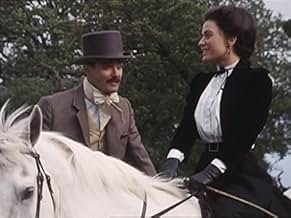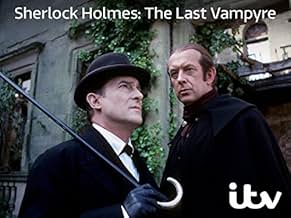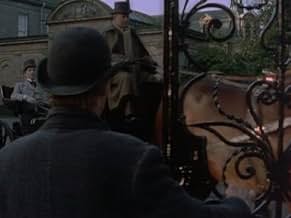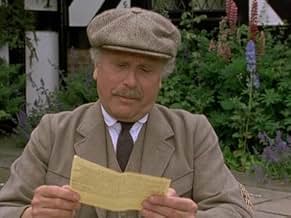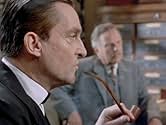The Case-Book of Sherlock Holmes
- Série télévisée
- 1991–1993
- 50m
Ajouter une intrigue dans votre langueHolmes and Dr. Watson solve the mysteries of the Disappearance of Lady Frances Carfax, Thor Bridge, Shoscombe Old Place, The Boscombe Valley Mystery, The Illustrious Client and The Creeping ... Tout lireHolmes and Dr. Watson solve the mysteries of the Disappearance of Lady Frances Carfax, Thor Bridge, Shoscombe Old Place, The Boscombe Valley Mystery, The Illustrious Client and The Creeping Man.Holmes and Dr. Watson solve the mysteries of the Disappearance of Lady Frances Carfax, Thor Bridge, Shoscombe Old Place, The Boscombe Valley Mystery, The Illustrious Client and The Creeping Man.
Parcourir les épisodes
Histoire
Le saviez-vous
- AnecdotesThe last performance of Dame Gwen Ffrangcon Davies. NOTE: She was 100. She gave up the stage in her 80s when her eyesight made moving around the sets unsafe. In several of her few film roles she appears seated.
- ConnexionsEdited into Biography: Sherlock Holmes: The Great Detective (1995)
Commentaire en vedette
These comments apply to all the Sherlock Holmes series and episodes produced by Granada and starring Jeremy Brett as Holmes and either Burke or Hardwicke as Watson.
Brett certainly gave the most definitive portrayal of Holmes. One must remember that Holmes, although a decent and upright gentleman had his dark side -- his conceit, impatience with people of lesser intelligence and, as a product of imperial Victorian England, he displayed traces of jingoism, racism, sexism and hypocrisy. Note that episode where he remarks on the French surname of a suspect or in the cavalier manner he uses pejoratives to refer to peoples of Asiatic origin. In another episode he tells Watson that his nemesis is "but a woman." Expecting high moral standards of others, he was nevertheless a drug addict (cocaine in the original stories by Doyle and also absinthe in the Granada series). He also used smoked opium occasionally when in disguise to track down suspects or missing persons. In one episode he was caught red-handed by Watson (the one portrayed by Hardwicke) with a syringe although it is not certain what drug it was supposed to contain, probably morphine as I doubt if heroin had already been extracted from opium at that time.
These flaws viewed in the context of the era and of the peculiar circumstances of Holmes, instead of making him out as an ogre, make him all the more human and believable. On the whole, however, Brett's Holmes is exceedingly kind, self sacrificing and high minded. He could also be quite droll and able to take jokes at his expense as when a phrenologist remarked that he would very much like to take a cast of the cranium of the very intelligent Holmes "until the original should become available." Note that he rarely collects fees and places life and limb on the line for his clients. No wonder the sophisticatedly discerning French have a Jeremy Brett society.
Between Burke and Hardwicke as Watson, one is likely to vote for Burke as he is funnier, younger and better looking. But Hardwicke better displays the character of a retired officer of the Indian (Imperial British) Army by his physical courage and readiness to use his firearm. His portrayal also brings out the difficult side of Holmes. It was to Hardwicke's Watson that Holmes unusually expresses (in a letter in Hound of the Baskervilles) deep concern and affection with such words as "there is nothing that I desire more than to have you safely back in our Baker st. lodgings." Finally, if you have seen all the episodes, watch them again and keep your eyes peeled for those delicious antiques -- porcelain washbowls, iron stoves, 19th century lamps, brass door knockers, handsome hansoms and carriages, even a pristine horse drawn red and brass fire engine with immaculate white hoses. And were those mansions, manor houses and country cottages merely sets or genuine locations? I suspect the latter. I would suggest to the English that they revise their Sherlock Holmes tours to include visits to places where Granada shot the series.
Brett certainly gave the most definitive portrayal of Holmes. One must remember that Holmes, although a decent and upright gentleman had his dark side -- his conceit, impatience with people of lesser intelligence and, as a product of imperial Victorian England, he displayed traces of jingoism, racism, sexism and hypocrisy. Note that episode where he remarks on the French surname of a suspect or in the cavalier manner he uses pejoratives to refer to peoples of Asiatic origin. In another episode he tells Watson that his nemesis is "but a woman." Expecting high moral standards of others, he was nevertheless a drug addict (cocaine in the original stories by Doyle and also absinthe in the Granada series). He also used smoked opium occasionally when in disguise to track down suspects or missing persons. In one episode he was caught red-handed by Watson (the one portrayed by Hardwicke) with a syringe although it is not certain what drug it was supposed to contain, probably morphine as I doubt if heroin had already been extracted from opium at that time.
These flaws viewed in the context of the era and of the peculiar circumstances of Holmes, instead of making him out as an ogre, make him all the more human and believable. On the whole, however, Brett's Holmes is exceedingly kind, self sacrificing and high minded. He could also be quite droll and able to take jokes at his expense as when a phrenologist remarked that he would very much like to take a cast of the cranium of the very intelligent Holmes "until the original should become available." Note that he rarely collects fees and places life and limb on the line for his clients. No wonder the sophisticatedly discerning French have a Jeremy Brett society.
Between Burke and Hardwicke as Watson, one is likely to vote for Burke as he is funnier, younger and better looking. But Hardwicke better displays the character of a retired officer of the Indian (Imperial British) Army by his physical courage and readiness to use his firearm. His portrayal also brings out the difficult side of Holmes. It was to Hardwicke's Watson that Holmes unusually expresses (in a letter in Hound of the Baskervilles) deep concern and affection with such words as "there is nothing that I desire more than to have you safely back in our Baker st. lodgings." Finally, if you have seen all the episodes, watch them again and keep your eyes peeled for those delicious antiques -- porcelain washbowls, iron stoves, 19th century lamps, brass door knockers, handsome hansoms and carriages, even a pristine horse drawn red and brass fire engine with immaculate white hoses. And were those mansions, manor houses and country cottages merely sets or genuine locations? I suspect the latter. I would suggest to the English that they revise their Sherlock Holmes tours to include visits to places where Granada shot the series.
- Deusvolt
- 6 juill. 2005
- Lien permanent
Meilleurs choix
Connectez-vous pour évaluer et surveiller les recommandations personnalisées
- How many seasons does The Case-Book of Sherlock Holmes have?Propulsé par Alexa
Détails
Contribuer à cette page
Suggérer une modification ou ajouter du contenu manquant

Lacune principale
What is the French language plot outline for The Case-Book of Sherlock Holmes (1991)?
Répondre
